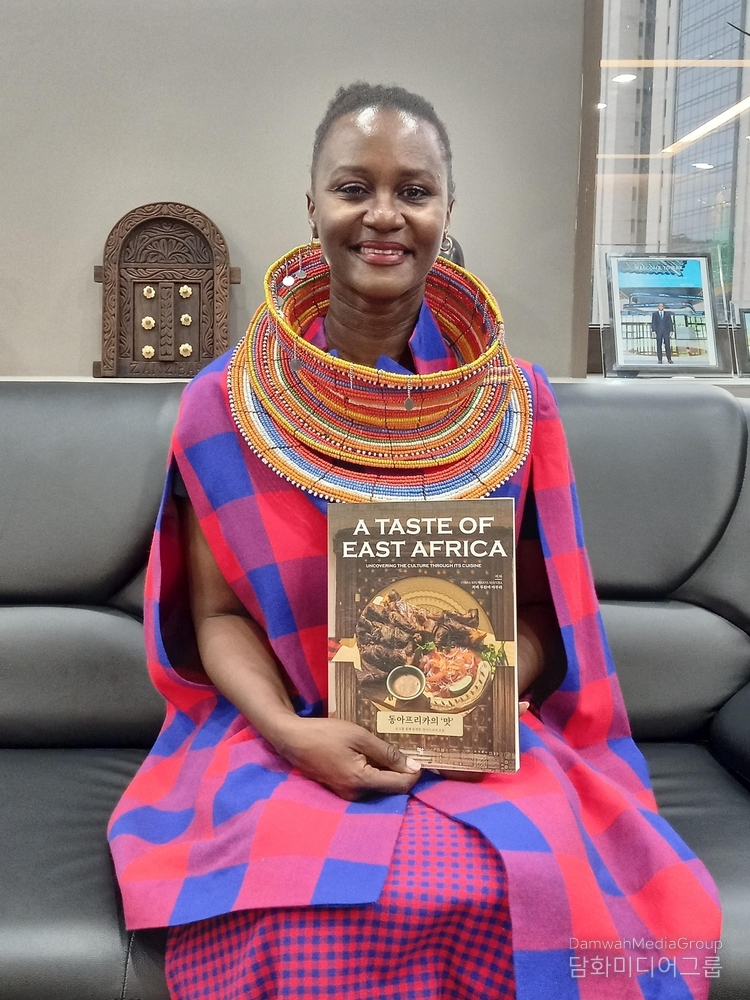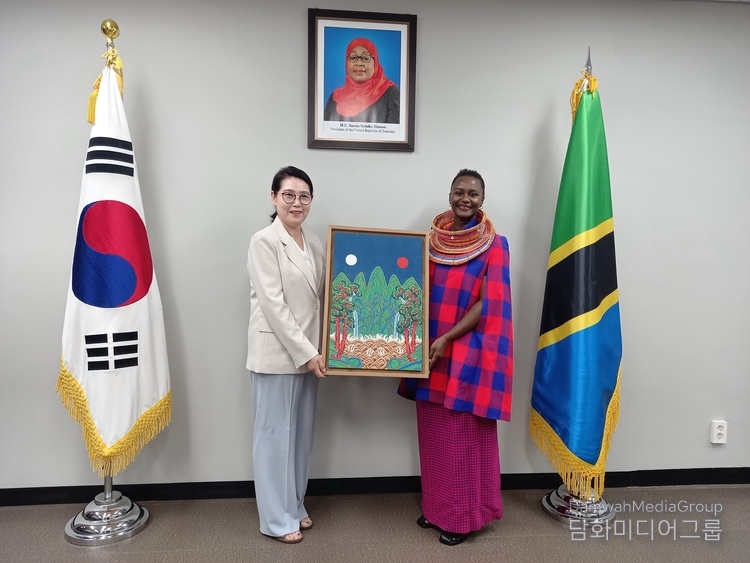By UN Journal Lee Kap-soo
“Culinary diplomacy is my tool as food plays a significant role in connecting people. I tried to introduce Africa's rich traditions and diversity through food,” said the spouse of the Tanzanian Ambassador to Korea and author of the book "The Tastes of East Africa: Uncovering Culture Through Cuisine.”

In an exclusive interview with Diplomacy Journal, Chaba Rhuwanya Mavura said, “I think this cookbook has been published at the right time when the Korea-Africa Summit was held in June, which was the very first summit of its kind between our nations, it is quite clear that the relationship between Korea and Africa is booming.
“Therefore, let this book be a gateway for one to easily travel through the tunnel of our history and discover and appreciate East Africa, a region that is rich in terms of geography, people, culture, and cuisine.”
Commenting that food can be used to unite people from all over the world, she said, "The Tastes of East Africa: Uncovering Culture Through Cuisine" is an invitation to explore and appreciate the diversity of flavors, history, and ways of life of the people of East Africa.

“By immersing ourselves in the region's culinary traditions, we can gain a deeper understanding of our culture and heritage. Through this book, we hope readers will not only savor the delicious dishes but also gain a newfound appreciation for the rich tapestry of East African culture. The book is meant to be a window to peek into the culture of Eastern Africans through its cuisine.”
The author also said, “East African cuisine is a melting pot. It carries African civilization and the cultural interactions between Africans, Asians, Arabs, and Europeans. This kind of cultural blending is uniquely East African and rare in Africa. One can say East African cuisines bring the world together.”
Following the interview, Cultural Editor Lee Mi-hyung of Diplomacy Journal who is also professor of the Department of Cultural Content, the Institute for Adult & Continuing Education of Myongji University, presented a folk painting to Chaba Rhuwanya Mavura, the spouse of the Tanzanian Ambassador to Korea as a gift.

The following is the main contents of the Diplomacy Journal’s interview with Chaba Rhuwanya Mavura, the author of the book "The Tastes of East Africa."
Question: What motivated you to write the “Taste of East Africa” book?
Answer: My primary motivation was to find an easy way to explain about my culture in a language that is simple, clear and inclusive, and that is food. As a spouse of an Ambassador, I realized I spent a good part of my time hosting delegations and supporting fostering work relationships between Tanzania and our hosting country Korea, and other countries. In doing so, hosting dinners, and promoting East African food became my routine. Therefore, culinary diplomacy is my tool as food plays a significant role in connecting people. As guests I host asked for more information and details of the recipes I prepare, I thought it was time to curate and share with a wider community to access their nearby Kyobo bookstore.
This cookbook tells a story about Africa's rich traditions and diversity through food. I found it to have been published at the right time, the Korea-Africa Summit in June, which was the very first summit of its kind between our nations, it is quite clear that the relationship between Korea and Africa is booming. Therefore, let this book be a gateway for one to easily travel through the tunnel of our history and discover and appreciate East Africa, a region that is rich in terms of geography, people, culture, and cuisine.

Q: Would you introduce the main contents of the book?
A: If there's one thing I know about food, it can be used to unite people from all over the world. "The Tastes of East Africa: Uncovering Culture Through Cuisine" is an invitation to explore and appreciate the diversity of flavors, history, and ways of life of the people of East Africa. By immersing ourselves in the region's culinary traditions, we can gain a deeper understanding of our culture and heritage. Through this book, we hope readers will not only savor the delicious dishes but also gain a newfound appreciation for the rich tapestry of East African culture. The book is meant to be a window to peek into the culture of Eastern Africans through its cuisine.
Each dish holds a story that teaches you more about the culture behind it. The richness of our region is well explained by its rich history and heritage, which is a result of generations and decades of migrations, slave trade, and colonialism that allowed the clash and fusion of culture and civilization, altogether making the region as vast and as diverse as the continent itself. East African cuisine is therefore a melting pot. It carries African civilization and the cultural interactions between Africans, Asians, Arabs, and Europeans. This kind of cultural blending is uniquely East African and rare in Africa. One can say East African cuisines bring the world together.
Q: Will you write another book in the future? Please introduce your future plan.
A: Absolutely whenever I find time I enjoy writing, and for years I have been sharing through online platforms such as https://chaba-rhuwanya.medium.com/ . Therefore, I know for sure I would like to publish a second book, to share my experience as a spouse of an Ambassador and share thoughts that will help those who come after me to understand and learn how this job may look not official, but has a lot of responsibilities and carries a lot of importance if it is executed well. The spouse of the Ambassador juggles a unique combination of family life, professional commitments, educator, cultural promotional, and other responsibilities such as managing migration from place to place and we navigate all of that with a lot of grace. In the meantime, I am working on publishing an English and Swahili version of "The Tastes of East Africa: Uncovering Culture Through Cuisine" because I published it first in the Korean language.
Q: As the spouse of an ambassador, please introduce your daily life in Korea, especially cultural activities.
A: I am very intentional about how I spend my time because I am a mother of three brilliant children, Pearl 15 years old, Edriss 13 years old, and Haleem, 5 years old. I have our Embassy to support, I am also, a dedicated member of the Ambassadors Spouses Association in Seoul – ASAS.
My family is my primary responsibility therefore between 5 am and 9:30 am I am dedicated to supporting my children as they go to school and my husband to his office. My commitment outside my family starts at 10: 30 am.
On almost everyday basis, my job is to support our Eembassy be in exhibitions, hosting and attending national day events or hosting and entertaining guests, and of course cultural exchange is among of the key agendas. Also, as a dedicated member of the ASAS, and as a Vice President, I am actively involved in planning, making appointments, and preparing for our members' community engagement, cultural exchanges, and our commitment to building meaningful relationships among members and that with our hosting country Korea. We engage with Korean society through various cultural and philanthropic activities. We so far have been supporting about three local organizations that are fostering abandoned children, children without parents, and those who require special needs such as Down Syndrome.
As ASAS we are very proud of our dedication to supporting social welfare centres. I have personally hosted some of these wonderful angels in our Tanzanian residence, it was a meaningful occasion in April, combining the joyous celebration of Eid with the opportunity to share and celebrate Tanzanian culture as April is also Tanzania National Day month. Hosting the girls from Sundukwon Centre was very meaningful. We practiced some of our culture's painted hands with henna; cook pilau - a fragrant and flavorful East African rice dish; practiced eating with hands like on page.20 of my book; and immerse in the joyful spirit of Tanzania through traditional rhythms and dancing. By sharing Tanzanian culture, it provided the girls with a unique and enriching experience but also fostered a sense of connection and appreciation for diverse cultures. Such cultural exchanges are invaluable in promoting understanding, breaking down barriers, and creating a more inclusive and harmonious experience between our two countries. The girls were very excited to learn that my President is a woman (H.E. Samia Suluhu Hassan), it is moments like this that build successful ambitions and dreams. I hope one of the girls will grow up to be an Ambassadors and President too themselves.
And of course, now that my book is being published, I spend more time to do cooking classes, sharing our cuisine and culture as well as signing books to groups and individuals. Currently, I collaborated with the Seongbuk Global Village Centre under their underlining message of understanding the culture of the world, I had a wonderful experience cooking together with a huge crowd. Thanks to our translator from our Embassy, I was proud to communicate Tanzanian recipes very well and most of the participants enjoyed the experience, to my surprise the end-result for each group was a very delicious lunch for all.
Q: Please introduce your country. What tourist attractions in Tanzania do you want to recommend to Korean tourists?
A: What an honor it is to introduce my country, Tanzania. Located in East Africa, is one of the most peaceful and politically stable countries in Africa. Since its independence in 1961, has never experienced a civil war or any major internal strife. Often hailed as one of the most hospitable countries in the world, Tanzania boasts warm and friendly people. Covering an area of 945,087 square kilometers, it is home to over 120 ethnic groups, each with unique traditions and customs, all united by one language: Swahili. Recognized by UNESCO as an Intangible Cultural Heritage, Swahili is celebrated on July 7th, designated as Swahili Language Day.
Tanzania, a land of breathtaking natural beauty, invites explorers to uncover its iconic destinations. Imagine standing on the vast plains of Serengeti National Park, where the air is filled with the thunder of hooves as millions of wildebeest embark on their annual migration, a spectacle that captivates the heart. Just beyond the horizon, the majestic Mount Kilimanjaro rises, standing proud as the world’s second-highest peak, its snow-capped summit whispering tales of adventure to those who dare to climb.
Tanzania's wonders don't end there. Venture to Zanzibar, the birthplace of legendary musician Freddie Mercury, where you can bask on some of East Africa's finest beaches. Picture yourself walking along idyllic sandy shores, surrounded by coral reefs teeming with vibrant marine life, and huge palm trees swaying gently in the breeze.
With seven UNESCO World Heritage Sites, Tanzania is a treasure trove of cultural and natural wonders, offering an experience that is both enriching and unforgettable. In every corner of this magnificent country lies a story waiting to be discovered.
The peaceful nation, warmth, and friendliness of the Tanzanian people, coupled with its awe-inspiring landscapes and mouthwatering cuisine, truly make it a remarkable country to visit. Should Tanzania be your next destination soon?!
Q: Please tell me what was the most rewarding or happiest moment while you have been living as the spouse of a diplomat.
A: One of my happiest moments has been supporting my husband in his mission to foster strong relations between the United Republic of Tanzania and the Republic of Korea. A significant highlight of my journey will be, being present for the first Korea-Africa Summit, where we hosted our President and her delegation. This experience has truly been a lifetime opportunity.
As a spouse, my role is straightforward—providing support to my family, adapting to new homes, and promoting our country whenever possible. While this may sound simple, it requires significant sacrifice, dedication, and a conscious effort to embrace this role. I take my responsibilities to heart and invest time in learning about the host country's culture, to effectively represent my country. I am happy and proud to embark on this journey and be present, here, in this time and space. And likewise, I am very happy to meet with you today and I hope that we can continue to foster this engagement.

